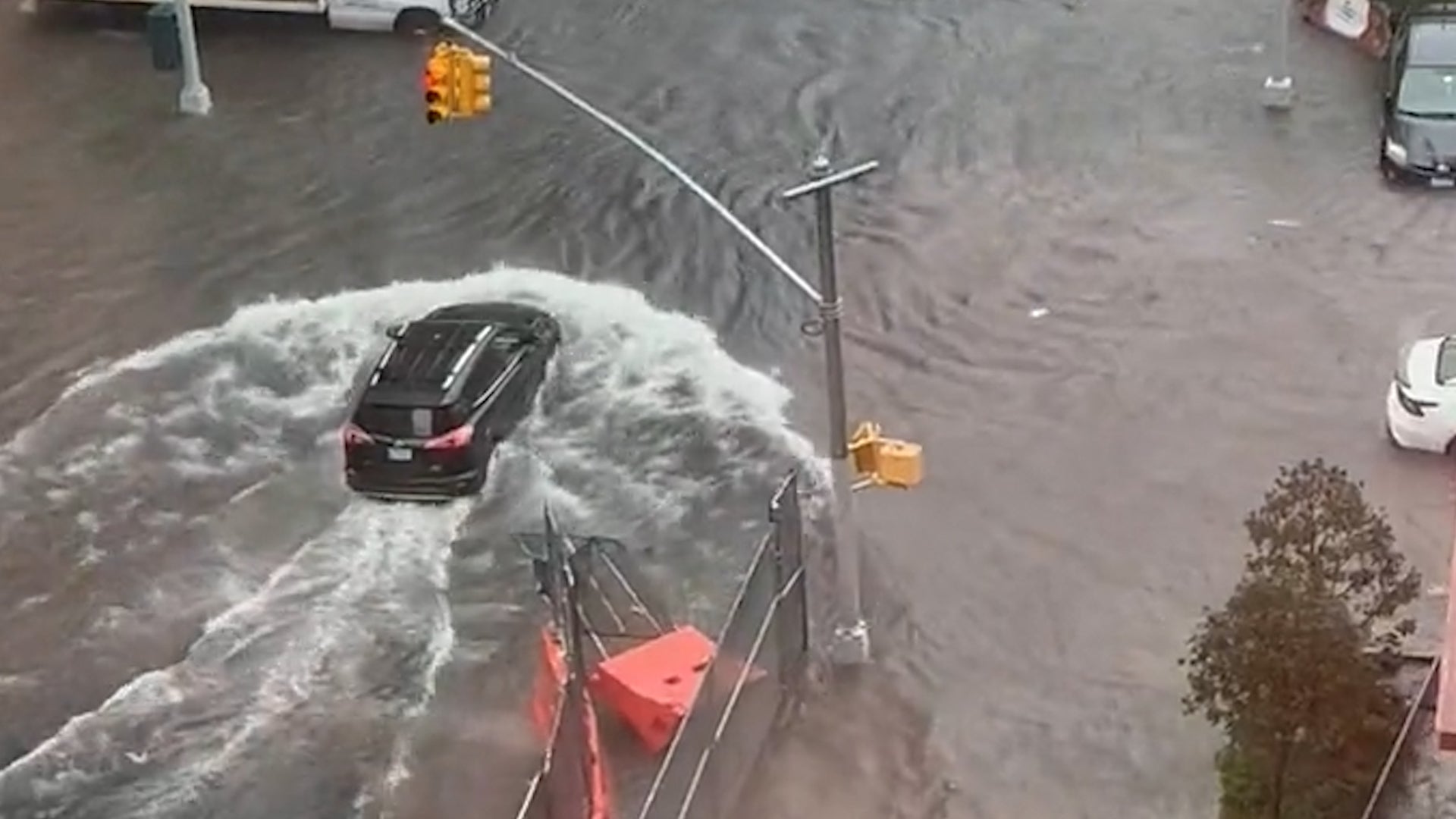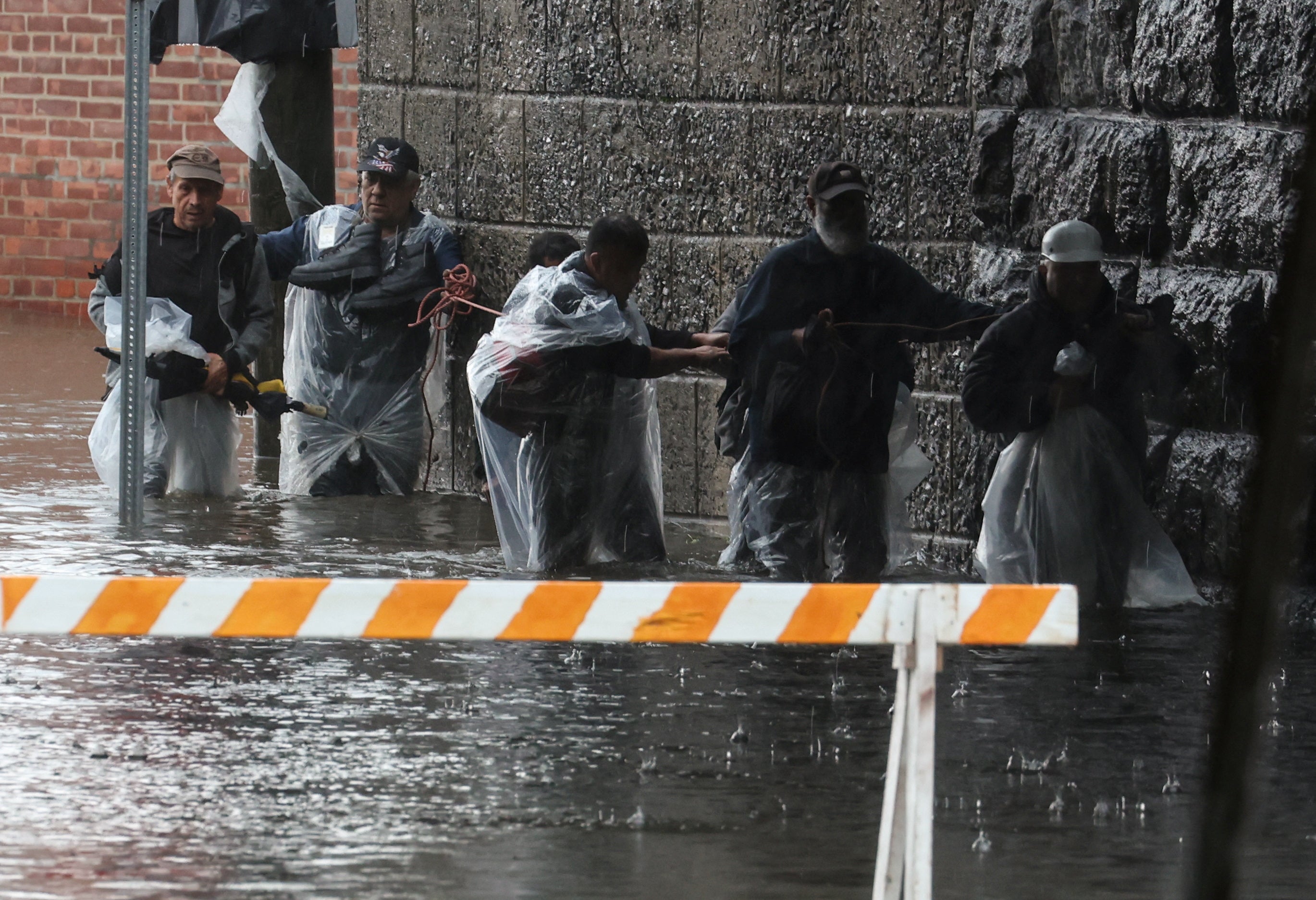New York engulfed in flooding as subway service buckles and residents urged to avoid noxious waters
‘Our climate is changing faster than our infrastructure can respond,’ says Rohit Aggarwala from New York’s Department of Environmental Protection
Your support helps us to tell the story
From reproductive rights to climate change to Big Tech, The Independent is on the ground when the story is developing. Whether it's investigating the financials of Elon Musk's pro-Trump PAC or producing our latest documentary, 'The A Word', which shines a light on the American women fighting for reproductive rights, we know how important it is to parse out the facts from the messaging.
At such a critical moment in US history, we need reporters on the ground. Your donation allows us to keep sending journalists to speak to both sides of the story.
The Independent is trusted by Americans across the entire political spectrum. And unlike many other quality news outlets, we choose not to lock Americans out of our reporting and analysis with paywalls. We believe quality journalism should be available to everyone, paid for by those who can afford it.
Your support makes all the difference.Parts of New York were under water on Friday as torrential rainfall caused flash flooding across the city on one of the wettest days in years.
A large storm system lodged over the region on Thursday night, leaving the five boroughs and parts of upstate New York, New Jersey and Connecticut under flood watches and warnings.
The rain continued relentlessly as the Friday morning rush hour commute began. By mid-morning, New York Governor Kathy Hochul had declared a state of emergency as highways were submerged, the subway system ground to a halt, and residents waded through streets in water up to their knees.
Mayor Eric Adams urged New Yorkers to stay home or “shelter in place” if they had already gone out to work or school. He warned that the city could see eight inches of rain before the storm passes.
Once again, the mayor came under fire after he did not speak publicly to New Yorkers until late Friday morning when conditions were already dire. Mr Adams had been criticised in June for his handling of New York’s air quality threat from Canada’s wildfires.
Three to six inches of rain had fallen by Friday morning with several more on the way in the next 24 hours, according to the National Weather Service (NWS). Some forecasters warned the flooding has the potential to be “historic”.
“Today is now preliminarily the wettest September day on record at JFK Airport, eclipsing the record from Hurricane Donna in 1960,” NWS tweeted, noting that 6.08 inches of rain had fallen since midnight. The previous record was 5.83 inches.
Half the New York subway system was suspended due to flooding and delays remained widespread on Friday afternoon. Commuter rail across the tri-state areas was suffering delays and cancellations due to impacts.
Janno Lieber, head of the Metropolitan Transportation Authority, said 3,500 buses were operating for those who needed to get around. But even those were not immune: Video posted online showed one bus in Brooklyn traveling through flooding with a submerged floor.
Roads and highways across the area were underwater while Terminal A at LaGuardia remained closed until further notice. Dozens of flights were cancelled and delayed there, and at nearby JFK. The heavy rain is also putting pressure on the rivers and streams, risking additional flooding, the NWS warned.
Governor Kathy Hochul declared a state of emergency for New York City, Long Island, and the Hudson Valley. She said that officials were particularly worried about basement homes, after a number of people drowned during Hurricane Ida two years ago.
“Plan your escape route. Don’t wait until water is over your knees before you leave. Don’t wait until it’s too late,” Ms Hochul said during a press briefing on Friday.

The rainfall was coming down at a rate of one to 2.5 inches an hour in some places. From 8am- 9am, the Brooklyn Navy Yard received 2.58in of rain, said Rohit Aggarwala, Commissioner of New York’s Department of Environmental Protection. The city’s 120-year-old sewer system was built to handle 1.75in per hour.
“This is the result of climate change. Our climate is changing faster than our infrastructure can respond,” Mr Aggarwala said. On a hotter planet, more moisture is held in the atmosphere meaning that storms have a greater likelihood of bringing intense rainfall.
Photos and videos posted on social media showed parts of the city under water including the Park Slope and Prospect Heights neighbourhoods of Brooklyn, where New Yorkers were seen wading in knee-high floods.

Dr Lucky Tran, who works in public health, warned people not to go into the waters. He tweeted a reminder that flooding in Brooklyn had occurred near the Gowanus Canal, a superfund site which “contains pathogens and is a threat to human health”.
Among the areas likely to experience flash flooding are Manhattan’s Lower East Side, East Village, Soho and Midtown; Coney Island, Rockaway Beach, Crown Heights in Brooklyn; and Jackson Heights, Forest Hills and LaGuardia Airport in Queens.
Across the Hudson River in New Jersey, flooding also hit Jersey City, Hoboken, Hackensack, Newark and Elizabeth. New Jersey Governor Phil Murphy ordered state offices to close at 3pm, except for essential staff.




Join our commenting forum
Join thought-provoking conversations, follow other Independent readers and see their replies
Comments